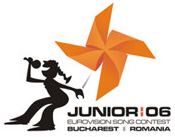
The European Broadcasting Union is an alliance of public service media organisations whose countries are within the European Broadcasting Area or who are members of the Council of Europe. As of 2022, it is made up of 112 member organizations from 54 countries, and 30 associate members from a further 19 countries. It was established in 1950, and has its administrative headquarters in Geneva and technical office in Brussels.

The Junior Eurovision Song Contest 2003 was the inaugural edition of the annual Junior Eurovision Song Contest for young singers aged eight to fifteen. It was held on 15 November 2003, in Copenhagen, Denmark. With Camilla Ottesen and Remee as the presenters, the contest was won by the then eleven-year-old Dino Jelusić, who represented Croatia with his song "Ti si moja prva ljubav" while second and third place went to Spain and the United Kingdom respectively. The next time that a country would win on its first attempt was Italy in 2014.

The Junior Eurovision Song Contest 2004 was the second edition of the annual Junior Eurovision Song Contest for young singers aged eight to fifteen. It was held on 20 November 2004, in Håkons Hall, Lillehammer, Norway and lasted 2 hours and 15 minutes. It was presented by Stian Barsnes Simonsen and Nadia Hasnaoui, broadcast in twenty countries and viewed by 100 million people. Eighteen countries participated, France and Switzerland participated for the first time.

The Eurovision Young Dancers 1985 was the first edition of the Eurovision Young Dancers, held at Teatro Municipale in Reggio Emilia, Italy on 16 June 1985. Organised by the European Broadcasting Union (EBU) and host broadcaster Radiotelevisione Italiana (RAI), dancers from eleven countries participated in the televised final.

The Eurovision Young Dancers, often shortened to EYD, or Young Dancers, was a biennial dance competition, organised by the European Broadcasting Union (EBU) and is broadcast on television throughout Europe. Thirty-seven countries have taken part since the inauguration of the contest in 1985; including Kosovo and Canada.

Switzerland has participated in the Eurovision Song Contest 62 times since making its debut at the first contest in 1956, missing only four contests, in 1995, 1999, 2001 and 2003. Switzerland hosted the first contest in 1956 in Lugano, and won it. Switzerland won the contest again in 1988, with the 1989 contest being held in Lausanne.

The United Kingdom first participated in the Junior Eurovision Song Contest at the inaugural 2003 edition which took place in Copenhagen, Denmark. ITV, a member organisation of the United Kingdom Independent Broadcasting (UKIB) and the European Broadcasting Union (EBU), was responsible for the selection process of their participation from 2003 to 2005. The United Kingdom used a national selection format, broadcasting a show entitled Junior Eurovision Song Contest: The British Final, for their participation at the contests. The first representative to participate for the nation at the 2003 contest was Tom Morley with the song "My Song For The World", which finished in third place out of sixteen participating entries, achieving a score of one hundred and eighteen points. United Kingdom withdrew from competing after the 2005 contest, but returned to the contest in 2022 in Yerevan, Armenia, with the British Broadcasting Corporation (BBC) replacing ITV as the country's broadcaster.
Eurovision is a pan-European television telecommunications network owned and operated by the European Broadcasting Union (EBU). It was founded in 1954 in Geneva, Switzerland, and its first official transmission took place on 6 June 1954. However, a year before the official launch, on 2 June 1953 the coronation of Elizabeth II was one of the first events to be broadcast across Europe.

Kathy Kirby was an English singer. She is best known for her cover version of Doris Day's "Secret Love" and for representing the United Kingdom in the 1965 Eurovision Song Contest where she finished in second place. Her popularity peaked in the 1960s, when she was one of the best-known and most-recognised personalities in British show business.

Yugoslavia participated in the Eurovision Song Contest 27 times, debuting in 1961 and competing every year until its last appearance in 1992, with the exceptions of 1977–1980 and 1985. Yugoslavia won the 1989 contest and hosted the 1990 contest.

The Junior Eurovision Song Contest 2006 was the fourth edition of the annual Junior Eurovision Song Contest for young singers aged 8 to 15. On 2 December 2006, the contest was broadcast live from Bucharest, Romania making it the second time the contest had been held in a capital city. It was organised by the Romanian national broadcaster, Romanian Television (TVR), in co-operation with the European Broadcasting Union (EBU).
The United Kingdom participated in the Eurovision Song Contest 2006 with the song "Teenage Life" written by Daz Sampson and John Matthews. The song was performed by Daz Sampson. The British entry for the 2006 contest in Athens, Greece was selected via the national final Eurovision: Making Your Mind Up 2006, organised by the British broadcaster BBC. Six acts competed in the national final and the winner was selected entirely through a public vote.

Portugal has participated in the Eurovision Song Contest 53 times since its debut at the 1964 contest. Since then it has missed five contests. The contest is broadcast in Portugal by Rádio e Televisão de Portugal (RTP). Portugal won the contest for the first time in 2017 and hosted the 2018 contest in Lisbon.

The Eurovision Young Musicians, often shortened to EYM, or Young Musicians, is a biennial classical music competition for European musicians that are aged between 12 and 21. It is organised by the European Broadcasting Union (EBU) and broadcast on television throughout Europe, with some countries holding national selections to choose their representatives for the contest.

The United Kingdom has participated in the Eurovision Song Contest 64 times. It first took part in the second contest in 1957 and has entered every year since 1959. Along with Sweden and the Netherlands, the UK is one of only three countries with Eurovision victories in four different decades. It is one of the "Big Five" countries, along with France, Germany, Italy and Spain, that are automatically prequalified for the final each year as they are the biggest financial contributors to the European Broadcasting Union (EBU). The British national broadcaster, the BBC, broadcasts the event and has, on multiple occasions, organised different national selection processes to choose the British entry. The United Kingdom has won the Eurovision Song Contest five times, and has finished as runner-up on a record sixteen occasions. The UK has hosted the contest a record eight times, four times in London and once each in Edinburgh (1972), Brighton (1974), Harrogate (1982) and Birmingham (1998), and will host the contest for a ninth time in 2023 in Liverpool.

The United Kingdom has participated in the biennial classical music competition Eurovision Young Musicians sixteen times since its debut in 1982, most recently taking part in 2018 after a 8-year absence. The United Kingdom hosted the inaugural contest in 1982 and won the contest in 1994. The country returned to the contest in 2018 as hosts, but did not return for the next edition in 2022.

The Eurovision Young Musicians 2018 was the nineteenth edition of the Eurovision Young Musicians contest. It was hosted by the United Kingdom, for the first time since the inaugural contest in 1982. This edition was a co-production between the European Broadcasting Union (EBU), the Edinburgh International Festival and the British Broadcasting Corporation (BBC) as host broadcaster. Musicians representing eighteen countries with EBU membership participated in the contest, with Albania making their debut alongside seven returning countries, while Austria withdrew from participation for the first time.

Wales participated in the Junior Eurovision Song Contest in 2018 and 2019. Welsh broadcaster Sianel Pedwar Cymru (S4C) has been responsible for the nation's participation in the contest.













